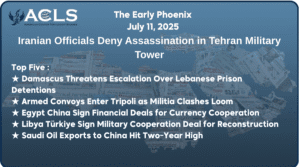Massive Protests Against Army-Brokered Deal in Sudan

“Thousands took to the streets of Sudan’s capital, Khartoum, Wad Madani, El Obeid south of the capital, Gedaref and Port Sudan in the east, Atbara in the north and Nyala in the southwestern Darfur region, this week, to mark the first anniversary of a military coup that upended the nation’s short lived-transition to democracy,” Le Monde reported on October 25. Sudanese Army Chief General Abdel Fattah al-Burhan declared that the army would distance itself from the political battleground in the country, but he then claimed that Islamist political forces are blocking the process of an agreement. Sudan Tribune, a government-led media outlet, reported on November 1 that “a group of lawyers loyal to the dissolved National Congress Party (NCP) on Tuesday launched an attack with sticks and tear gas on the Sudanese Bar Association headquarters, in an attempt to seize it.”
On October 29, thousands more demonstrators gathered in front of the headquarters of the UN mission in Khartoum to protest against the expected political settlement between the military and civilians, and against foreign interference in the country’s internal affairs. The United Nations delegation’s spokesperson, Florence Marshal, stressed that UNITAMS, the African Union and IGAD are working with the Sudanese parties to reach a broad understanding that leads to a solution, but signaled that these talks were unlikely to be concluded soon.
Putin’s Mercenaries Deepening Their Involvement in Sudan

On November 2, the European think tank OCCRP reported that Russian mercenaries are playing a significant role in Sudan’s conflict. “Wagner, the Russian mercenary company owned by the infamous businessman Yefgeny Prigozhin, secured and maintained its position in Sudan’s gold sector while working closely with companies affiliated with Sudan’s brutal military,” the OCCRP report stated. The investigative report also explained that the Sudanese military companies are purchasing arms with gold. Richard Messick, an anticorruption expert, said Wagner and the Sudanese military were “two of the blackest of the black figures in the world economy.” The OCCRP report illustrates that the Russian role in the Sudanese conflict receives too little notice in Washington.
Turkey and Libya’s Tripoli-based Government Sign Military and Economic Deals

Eleven years after the UN-assisted overthrow of Ghadafi in 2011, Libya is still struggling to reach an agreement between its rival administrations to hold national elections. Currently, there are two governments in Libya, the UN-supported government in Tripoli, also supported by Turkey; and the rival government in Benghazi supported by Russia, the UAE, and Egypt. As one analyst noted, “While all parties involved agree on the importance of restoring and maintaining stability in Libya, they disagree on how this goal can be achieved.”
Turkey supports Abdul-Hamid Dbeibah’s government in Tripoli while Egypt remains a key ally of Khalifa Haftar, the former head of the Libyan Army during Ghadafi’s rule who still controls most of the eastern parts of Libya. The Egypt-Turkey dispute over Libya deteriorated further earlier this month when the Dbeibeh government signed a memorandum of understanding with Turkey on the exploitation of Libyan hydrocarbons. On October 25, Dbeibah’s government also signed two new military cooperation agreements with Turkey based on a 2019 agreement between Ankara and the government of Fayez al-Sarraj–a deal that gives Turkey claim to large and potentially gas-rich areas of the eastern Mediterranean, angering Egypt, Greece, France and the European Union, reported The Defense Post.
Libya-Turkey Deals Anger Egypt, Lead to Halt in Cairo-Ankara Dialogue
In response to the new Libya-Turkey economic and military agreements, Egypt on October 29 halted its Libya-focused dialogue with Turkey, with Egyptian Foreign Minister Sameh Shoukry explaining that Egypt took the step “because there was no change in Turkey’s practices in Libya.” According to Shoukry, the Libya-Turkey agreements further complicate the situation in Libya and makes it more difficult to reach a common agreement between Libyan parties in order to hold long-awaited national elections.
Algeria Explains Muhammad bin Salman’s Absence from the Arab Summit

The Algerian presidency released a statement before the beginning of the Arab League Summit that Saudi Arabia crown prince Mohmad Bin Salman had to withdraw from attending the Arab League Summit on advice from his doctors not to travel. The Saudi royal court confirmed that doctors have advised the crown prince to “avoid long-haul flights that might affect his middle ear.”
The statement released on the Algerian Press Service said that MBS called President Abdelmadjid Tebboune to apologize for for not being able to participate in the summit on November 1, in accordance with the recommendations of doctors who advised him not to travel.
Algeria, since the removal of President Bouteflika in 2011, is still being led by the former president’s housing minister, Mr. Abdelmadjid Tebboune, now 74.



